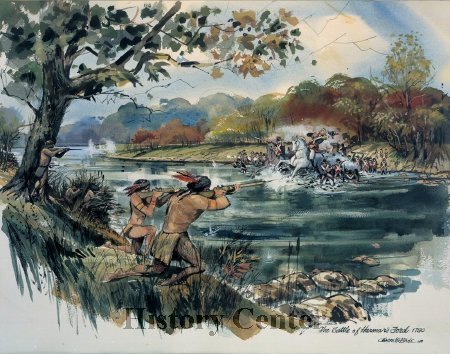Date:
1790
Title:
Harmar Musket
Description:
Harmar's Defeat
When westward expansion spread into the Old Northwest, and waves of Americans began to encroach on the lands of the natives, the conflict often resulted in internecine violence. In order to protect the pioneers as they settled in the West, General Josiah Harmar was sent by George Washington to destroy the Indian towns that stood as a barrier to American migration across the Ohio River Basin. His ill-prepared men were no match for the Miami and their allies. General Harmar was defeated by the Miami Indians led by Chief Little Turtle at the Battle of Kekionga on 22 October 1790, the worst defeat of the United States Army up to that time.
This French model 1768 Charleville flintlock musket and bayonet were found in the St. Joseph River in 1893, near the site where 183 United States soldiers were killed as they were repelled from Kekionga. The musket butt is marked "US" and was likely carried by a fallen regular army soldier rather than a mili-tiaman.
When westward expansion spread into the Old Northwest, and waves of Americans began to encroach on the lands of the natives, the conflict often resulted in internecine violence. In order to protect the pioneers as they settled in the West, General Josiah Harmar was sent by George Washington to destroy the Indian towns that stood as a barrier to American migration across the Ohio River Basin. His ill-prepared men were no match for the Miami and their allies. General Harmar was defeated by the Miami Indians led by Chief Little Turtle at the Battle of Kekionga on 22 October 1790, the worst defeat of the United States Army up to that time.
This French model 1768 Charleville flintlock musket and bayonet were found in the St. Joseph River in 1893, near the site where 183 United States soldiers were killed as they were repelled from Kekionga. The musket butt is marked "US" and was likely carried by a fallen regular army soldier rather than a mili-tiaman.


